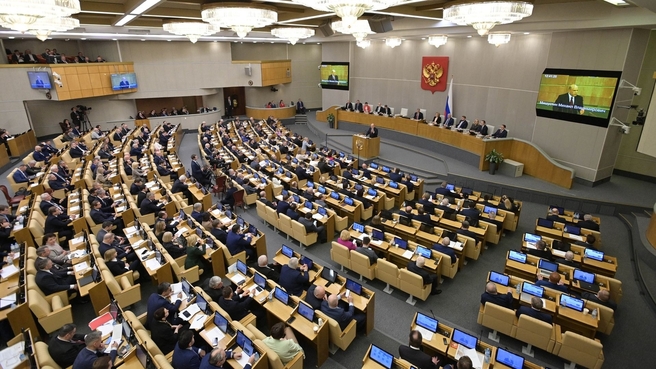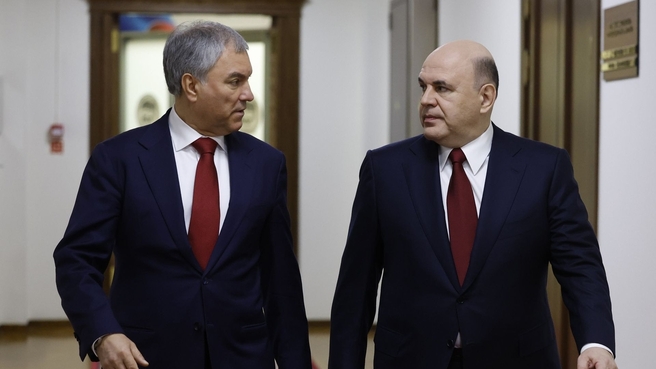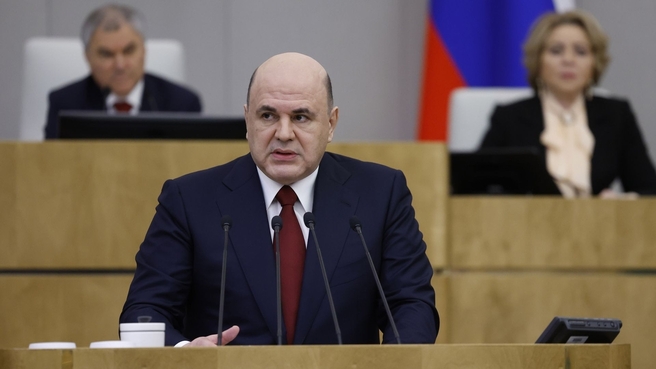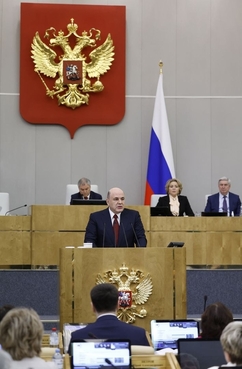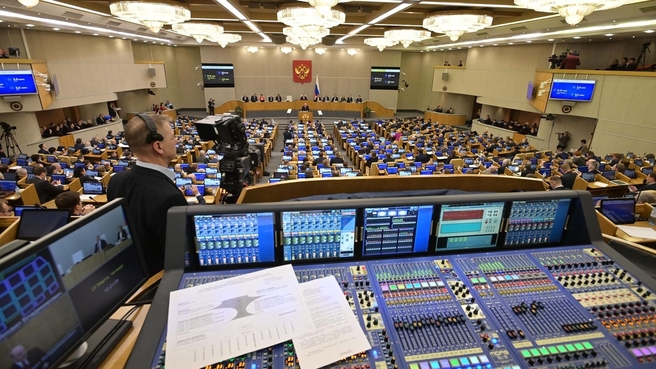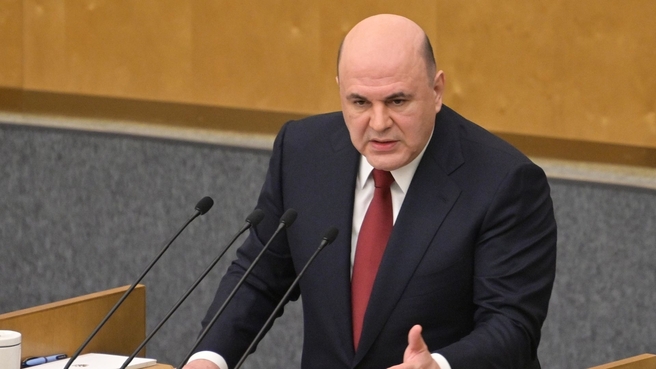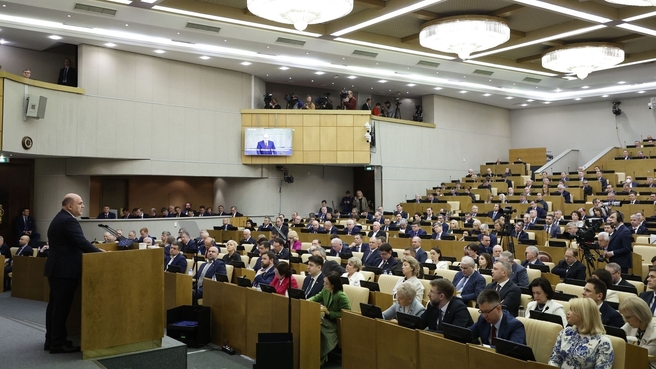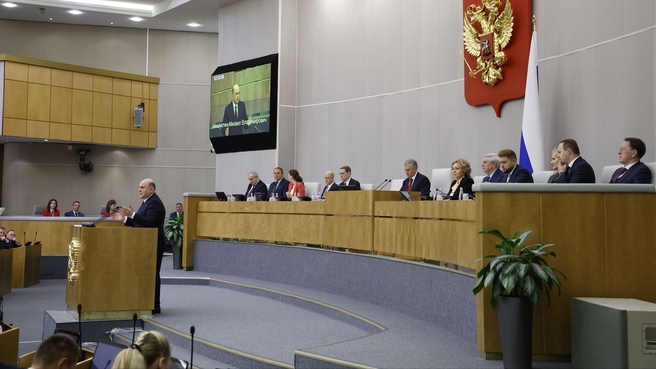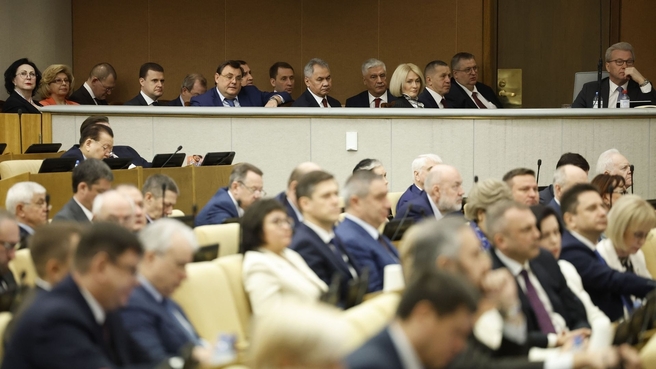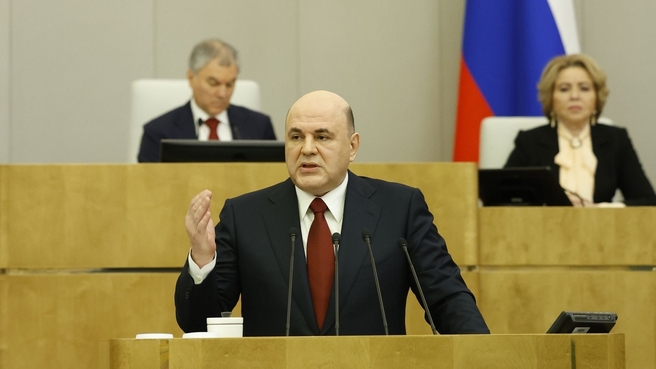RUSSIA, March 23 - Mikhail Mishustin and State Duma Speaker Vyacheslav Volodin “The Government of the Russian Federation: <…> shall submit to the State Duma annual reports on the results of its work, including on issues raised by the State Duma” (The Constitution of the Russian Federation, Article 114, Paragraph 1a).
The Government’s annual report to the State Duma
Excerpts from the transcript:
Mikhail Mishustin: Mr Volodin, Ms Matviyenko, Deputies of the State Duma, Colleagues,
Today, I am presenting the fourth report about the Government’s activities. We have discussed part of its topics in detail at meetings with the parliamentary parties.
I will focus on the results we achieved last year, and on our future development priorities.
I think there is no need to explain in this hall the conditions in which all of us had to work. A sanctions blow was delivered against Russia, one unequalled in force in recent history.
In the beginning, the West attempted to assure everyone that the sanctions were not directed against Russian citizens. There were no particular illusions on this score even then, but now even a person unversed in global politics is aware that it is the Russian people who are their main target.
They tried to bring down our financial system so that people would not be able to use bank cards. They tried to disrupt economic and business ties. They made their own companies leave the Russian market with great losses, so that the goods we are used to would disappear from the shelves, and to throw out Russian employees of those companies on the street and deprive them of income. That is, the people whose hard work created their multibillion profits. They wanted to provoke mass unemployment and drastically decrease the quality of life in our country.
They stopped at nothing: they blew up the Nord Stream gas pipelines, arrested bank accounts, and banned Russia from the international payments system. They tried to block all banking operations and all other economic activities.
Remember what they said about the sanctity, the inviolability of private ownership. But the property and money of our people and companies are being arrested just because they are from Russia.
Last year, we had to respond to challenges created by yet another package of sanctions almost every day. They required a prompt response and a constant search for an answer to the question: what will happen next? We were working on countermeasures to protect the people, while at the same time laying the foundation for the ability to move forward, ensure economic growth and reach the national targets set by the President.
We were doing this together with you. All branches of power, regardless of the level – federal, regional and local – worked efficiently to implement tasks that were crucial for the state. Thanks to our coordinated efforts led by the President, we managed to deal with the most complicated issues of the past year.
I want to thank the State Duma, the Federation Council, regional heads and all people of Russia who helped in each region and each municipality. We have overcome all challenges together.
Last spring, analysts predicted a double-digit fall of the Russian GDP. But we survived.
It was not easy. The decline, inevitable in this situation, was quite moderate. However, we managed to bring the economy back to the growth trajectory.
Now, even some international organisations are saying that we will see growth in 2023 and leave behind the developed economies in terms of GDP growth in 2024.
This is not the first time that our economic system has shown such flexibility. In 2020, amid the CIVID pandemic, it showed that it was more stable than had been expected. We overcame that crisis more confidently than many Western countries which saw a bigger drop of GDP.
In March 2022, at the instruction of the President, the Government and the Bank of Russia developed measures to stabilise the situation in the financial sector.
Due to the prompt and precise actions of the Central Bank leadership, the work of lending institutions and currency and stock markets was normalised. We avoided the external blocking of transactions inside the country to a large extent due to the existing national settlements infrastructure. The replacement of the dollar and euro in our foreign trade has allowed us to expand operations with friendly states.
Payments for goods and services and money transfers are being made as usual. All bank cards in Russia continue working. We managed to alleviate the inflation pressure as well and maintain the stability of the banking sector.
Our joint decisions formed the basis of a priority action plan to ensure economic development in the face of external sanctions pressure.
It included more than 300 measures which had been selected out of 33,000 proposals received from all over the country. By June, the impact of negative factors had already markedly decreased, and we approached the third quarter with a certain margin of safety.
Significant funds were earmarked for the implementation of the plan. Direct support from the budget and the National Welfare Fund alone amounted to 1.5 trillion roubles.
Almost 4 trillion roubles were allocated under various programmes for concessional lending to companies, and that's not counting VEB.RF guarantees for about 1 trillion roubles. We also restructured loans at floating rates and under the Bank of Russia programmes amounting to about 6 trillion roubles.
The implementation of these measures made it possible to promptly resolve the most important tasks.
In implementing them, we relied on primary data from all sources. We used reliable feedback from people and businesses, which the President always reminds us to fall back on. We created a new platform management model.
Modern information technologies enable us to pursue a coordinated policy in all sectors and the social sphere and support their development using budgetary funds.
We work in close coordination with the State Council, the Presidential Executive Office, the Bank of Russia, public associations, companies and corporations.
We made it much easier to do business.
Income tax rates have been lowered for companies in a number of sectors. The cadastral value of property for calculating payments to the state was frozen. Deferments were provided on payment of insurance premiums and VAT was reduced to zero for hotel services.
In addition, we helped with working capital, primarily through a line of preferential loan programmes. More than 1.5 trillion roubles were issued to major companies in industry, agriculture, transport, energy and information technology.
Thanks to these steps, businesses have been able to free up resources and channel them into restructuring their production and logistics chains and adapting to the new conditions.
More than 200 licences and permits can now be processed through the public services portal and, importantly, it can be done much faster than before, with less paperwork.
We continue taking efforts to reduce administrative burden, with introduction of a number of mandatory requirements postponed and over 2.5 million business permits plus some 5 million driver’s licenses automatically renewed.
These measures have allowed our citizens and companies to save over 300 billion roubles.
For Russian-based foreign organisations, we have simplified the mechanism for transferring registration from the foreign to domestic jurisdiction in special administrative regions on the Oktyabrsky and Russky islands in the Kaliningrad Region and in the Primorye Territory, respectively. Over the past year, 83 companies have already re-registered in those territories, which is triple the number compared to the previous period.
Solving urgent tasks of economic stabilisation has allowed us to achieve, under the current conditions, the national development goals set by the President, as well as national projects, strategic initiatives, and government programmes.
In 2022, most national projects were executed at nearly 100 percent of the annual plan, meaning that schools, roads and hospitals were built as scheduled.
We have also re-launched the entire mechanism of state programmes. Digital modernisation has allowed for a greater interaction between departments, reducing the problem-solving period from 90 to 10-15 days. These results are also close to 100-percent implementation.
The Government has taken consistent efforts to focus its activities on 12 medium-term priorities in order to accelerate the economy’s adaptation to the current challenges. I should emphasise that those include no secondary ones. I will name them not in order of their importance but just as they are listed as each one is equally relevant for the lives of our citizens and for our economic development.
The first priority: as I have already mentioned, last year’s key achievement was that we maintained macroeconomic stability. The federal budget remains the core tool for implementing all our plans. We have adjusted our policy in this area as well, focusing on strengthening financial stability and reducing the impact of the forced restructuring of economic ties on the medium- and long-term economic potential.
Additional funds were allocated for anti-crisis programmes aimed at providing affordable resources, facilitating deliveries of imported equipment and parts, and supporting basic industries and the most vulnerable groups of citizens.
I want to thank all of you for promptly introducing amendments to the relevant legislation. We have jointly drawn up and adopted a balanced three-year budget; this is a socially oriented document and a development budget.
<…>
Following the President’s instruction, we made medical rehabilitation more accessible. More than 1.3 million citizens underwent rehabilitation.
Previously, this type of care was primarily inpatient, and a person had to go to hospital. Now it is available on an outpatient basis and in other formats convenient for people. For this, over 150 regional medical organisations and 400 specialised departments were outfitted with all the necessary equipment last year. Approximately 9 billion roubles have been allocated for this, and almost 2 billion more – to equip 28 federal centres. People across the country now have additional opportunities to improve their health. We also intensified the fight against socially significant diseases. Last year, 74 outpatient cancer care centres opened in half of the country's regions. Now there are such centres in all the Russian regions. We are upgrading vascular centres and their primary care departments.
During my report to the State Duma last year, I asked you to expedite the adoption of the draft law on a unified register of bone marrow donors. I want to thank you for promptly addressing this issue and for the lives saved. The register was launched in September. It contains information about more than 190,000 donors, which is almost three times the number of entries in the largest local register that existed before. We have never had such a large-scale database before, each line of which is a chance for people to recover.
Thank you!
Yet another important priority is developing the social sphere, primarily improving the quality of life and wellbeing of Russia’s citizens. Given the sanctions pressure and the resulting surge of inflation, it has become the main trend in our work to support people’s incomes. Therefore, following the President’s instructions, we used a special procedure on two occasions – starting 1 June 2022, and then early January of this year – to raise the minimum wage. As a result, it has increased by more than 13.5%. We did the same with the minimum living wage, which has increased by almost 17%. This means that we have managed to preserve the incomes of 15 million people.
I am referring, among others, to families with children, who have found themselves in a difficult financial situation. We are trying to make assistance to them as targeted as we possibly can so that it can take life circumstances into account. As of 1 April 2022, we expanded monthly payments to all needy parents with children aged 8 to 17 years. It averages from 6,000 to 12,000 roubles per child per month depending on individual situations. In this way we have given support to over 3.5 million families that are bringing up about 5.5 million children.
Generally, we are making the granting of all government support to people more simple and convenient and based on social treasury principles. By now, we have converted to this format 31 federal social protection measures. This means that nearly 35 million people will now receive targeted payments either automatically or based on a single online application.
We have preserved and expanded the maternity capital programme, which has proved its effectiveness and relevance. Last year, it was an important source of support for 1.3 million families, which used these funds – more often than not to improve their living conditions. And we began indexing it to the actual inflation rate, not the forecasted one as in the past. Since 1 February of this year, maternity capital has grown by almost 12% to nearly 587,000 roubles for the first child and over 775,000 roubles for the second.
Now parents can use it to pay for educational services for their children rendered by individual businessowners.
There are expanded opportunities for using maternity capital funds to provide monthly payments. Families whose income is less than double the living wage can receive them not only for their second child but also all their children aged up to three years regardless of the birth order in the amount of one minimum living wage per child per month.
We have extended maternity capital to cover the Donetsk People’s Republic, the Lugansk People’s Republic, the Zaporozhye Region and the Kherson Region. In keeping with the President’s instruction it can be available to all families in these constituent entities of Russia, whose children were born or adopted after 1 January 2007.
An important social trend is providing care for older generations. In keeping with instructions issued by the head of state, we adjusted the non-contributory pensions of unemployed old-age pensioners by more than 8.5% in early January and by another 10% on 1 June. Thus, their average amount increased by approximately 3,000 roubles to over 20,000 roubles.
Now let us talk about healthcare.
Preserving and strengthening people’s health and boosting life expectancy are hugely important national tasks.
All of us would like to see a strong and modern Russia. This means that people should always have an opportunity to get high-quality medical treatment or have a check-up without a long wait. This should apply in particular to elderly people and parents with children.
Last year, over 270 hospitals and outpatient clinics were built, as were 700 rapidly erected medical and obstetric stations and outpatient clinics. Thorough overhauls were completed at 1,300 facilities, with 37,000 units of equipment supplied plus 2,000 ambulances and 4,000 vehicles for transporting doctors and patients.
We have increased availability of high-tech medical assistance by adding eight new types offered at federal medical organisations. Almost 1.5 million people took advantage of this assistance free of charge last year (which is 10 percent more than in 2021), including high-cost heart or vascular surgeries and organ and tissue transplants. These are not just dry statistics, they represent the painstaking work of top-notch doctors and the curing of many grave illnesses.
Colleagues,
I would like to address the issue of children’s healthcare separately. It is necessary to take care of the well-being of the younger generation from an early age. This is a task not only for parents, but also for us, for the entire state. After all, we all want our children to grow up happy and healthy.
We launched a unique programme to expand neonatal screening. It allows doctors to diagnose 40 congenital and hereditary diseases at the earliest stage and immediately provide assistance and prescribe the necessary treatment for a child. We are talking about saving the lives of several thousand babies every year.
We purchased about 300 units of medical and laboratory equipment worth almost 1.5 billion roubles and trained specialists.
Previously, this screening was available only in pilot regions, but this year, we held large-scale neonatal evaluations throughout the country. This programme will continue free of charge for citizens. Not only is diagnosis important, but also timely treatment. As you know, a special foundation called the Circle of Kindness was created, at the President’s initiative, to help children with serious, rare diseases. It has been operating for about two years. But in such a short time, it has already provided support to more than 5,000 children.
In December, a very important decision was prepared following the President’s instruction, which will allow even more young patients to receive medicines paid for by the foundation. These are children with so-called high-cost ICD diseases. Thank you, colleagues, for your support and for adopting this law.
Now about education.
I will start with preschools. A few years ago, parents had a hard time placing their child in a kindergarten. There weren't enough places. Due to the Government’s assistance, Russian regions have been building plenty of kindergartens – almost 240 in 2022, and more than 1,000 over the past three years. They will serve over 150,000 children.
To maintain this standard across Russia, we supported the regions that had the biggest difficulties, the Trans-Baikal Territory, and the republics of Buryatia and Ingushetia, by allocating 6 billion roubles. By the end of this year, they will carry out major repairs of kindergartens that need it. As many as 36 new kindergartens have been built. Places at preschools for children aged 3-7 are now available all over Russia.
To provide them with opportunities to attend modern schools after kindergarten, we are implementing presidential programmes to build and renovate educational institutions. Last year, more than 1,500 school buildings were renovated, and over 250 new ones built. But a school is more than walls and new furniture. They need equipment, textbooks and other materials, and the internet. We are providing pupils with all these things in every part of the country.
At the same time, we are updating the fleet of school buses so that the children can safely get to their schools. More than 4,000 school buses have been procured. During my working trips, the heads of the regions personally told me that school buses were crucial, especially in rural and remote areas.
Colleagues,
The best achievement of Russian education is the children’s victories. Russian teams annually participate in the eight most significant international school Olympiads. Last year, they won 43 medals, mostly gold and silver (32 and 11, respectively). This is the best result in terms of gold medals in the last 10 years.
I congratulate these pupils from the bottom of my heart. I am proud of them and of our country. It is especially gratifying because this year has been declared by the President the Year of Teachers and Mentors. And I certainly want to thank every teacher and mentor who prepared the winners. They should get a large share of the credit for their pupils’ success because they have invested a lot of knowledge and effort in them.
It is important to create proper conditions for the younger generation to engage in creative projects. To do this, we are modernising children's art schools. About 200 of them have been renovated, and 300 were supplied with new musical instruments, equipment and educational materials to make sure that the children who attend classes there could try various arts and be exposed to culture.
On Saturday, we will mark the professional holiday of cultural workers. I sincerely wish each of them all the best and every success.
More to be posted soon.

